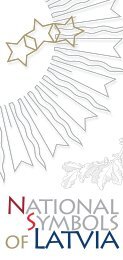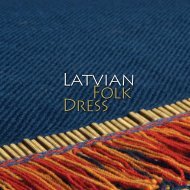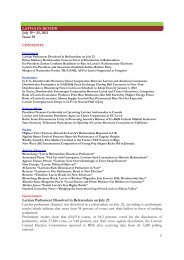LATVIA IN REVIEW - Latvian Institute
LATVIA IN REVIEW - Latvian Institute
LATVIA IN REVIEW - Latvian Institute
You also want an ePaper? Increase the reach of your titles
YUMPU automatically turns print PDFs into web optimized ePapers that Google loves.
The new policy suggests a defense financing model that would help to reach 2 percent of gross<br />
domestic product (GDP). Sārts said that financing for defense should be increased each year by<br />
0.1 percent of GDP. The goal of 2 percent of GDP should be reached in 2020. Such a model<br />
would require additional 15 million lats each year (EUR 21 mln).<br />
"The current defense budget was appropriate for the crisis time, and we were able to do it thanks<br />
to understanding of other NATO member states, but we should not expect that we will be able<br />
to live on the account of others in the future. Therefore it is important to say before the NATO<br />
Chicago summit that the crisis is over and we will return to 2 percent of GDP by 2020," said the<br />
state secretary.<br />
He also underscored that the money should be spent wisely.<br />
"The world is not becoming calmer, it is becoming more complicated. Speaking about Europe's<br />
stability and security, we should not exclude unexpected events," he said.<br />
The State Defense Policy prepared by the Defense Ministry provides that the National Armed<br />
Forces (NAF) should be able to ensure constant participation of 8 percent of its staff in<br />
international operations.<br />
Data suggest that Latvia's contribution in NATO is one of the weakest ones. For example, in the<br />
coming four years Latvia is able to meet only one third of its NATO liabilities and Latvia's<br />
defense budget against the gross domestic product (GDP) is one of the lowest in the alliance.<br />
The policy has been planned for the term of the incumbent parliament, which is for the next<br />
three years.<br />
(EUR 1 = LVL 0.7028)<br />
Parliament Sub-committee to Call for Broad Debate on Amendments to Citizenship Law<br />
Baltic News Service<br />
RĪGA, Apr 08, BNS - The sub-committee established under the <strong>Latvian</strong> parliamentary legal<br />
committee to work on the amendments to the citizenship law will invite several ministries to a<br />
debate on the still uncertain aspects of the new law concerning the citizenship and loyalty.<br />
MP Ingmārs Čaklais, a member of the ruling Unity party chairing the sub-committee, told BNS<br />
that the debate would be organized after Easter holidays and representatives of the Culture<br />
Ministry, the Education Ministry, the Interior Ministry and the Foreign Ministry would be invited<br />
to participate in the discussion.<br />
"The sub-committee has essentially approved part of the proposals but we need to finalize the<br />
wording to ensure quality legislation. This will be our main task after April 16,” he said.<br />
But there are other proposals on which the committee has failed to agree so far, including<br />
whether the law should name specific third countries whose citizens of <strong>Latvian</strong> descent would be<br />
entitled also to <strong>Latvian</strong> citizenship. This would apply to ethnic <strong>Latvian</strong>s living in the countries<br />
such as Australia, New Zealand, Brazil, etc.<br />
It also is not clear how many other citizenships a <strong>Latvian</strong> citizen should be allowed to have,<br />
Čaklais said.<br />
After the amendments to the citizenship law are approved by the sub-committee, they will be<br />
sent to the legal committee which will decide about putting the amendments between the<br />
parliament for review in three readings.<br />
The <strong>Latvian</strong> government earlier approved the draft amendments to the citizenship law prepared<br />
by the Justice Ministry. The proposed amendments will make possible double citizenship --<br />
<strong>Latvian</strong> citizens will also be able to have the citizenship of some EU, NATO and European Free<br />
Trade Association (EFTA) member country. Double citizenship will also apply to children<br />
entitled to natural-born citizenship of another country, if one or both parents are <strong>Latvian</strong><br />
citizens. Also, a child born to parents, who are Latvia’s non-citizens, will be able to become a<br />
<strong>Latvian</strong> citizen, should at least one of the parents wished so.<br />
2






